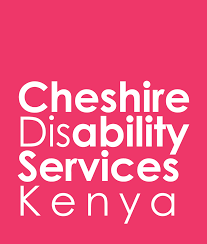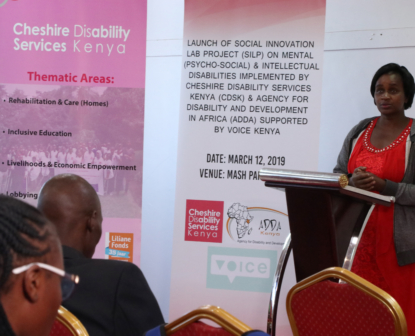Project
Disability Social Innovation Lab
-
Amount Funded
175,359 EUROProject Duration
18 Sep 2018 - 14 Sep 2020 -
-
Lead organisation
Partners
Agency for Disability and Development in Africa (ADDA)
-
The Cheshire Disability Services Kenya (CDSK) is a disability-focused local organisation and a member of Global Alliance of Leonard Cheshire Disability and a Strategic Partner Organisation (SPO) of Liliane Foundation (LF) the Netherlands.
CDSK works with a network of 55 local Partner Organisations to support 3,414 children and youngsters with disabilities in four thematic areas namely:
- Rehabilitation & Care
- Inclusive Education
- Livelihoods & Economic Empowerment
- Lobbying & Advocacy.
-
Organisation
The Cheshire Disability Services Kenya (CDSK) is a disability-focused local organisation and a member of Global Alliance of Leonard Cheshire Disability and a Strategic Partner Organisation (SPO) of Liliane Foundation (LF) the Netherlands.
CDSK works with a network of 55 local Partner Organisations to support 3,414 children and youngsters with disabilities in four thematic areas namely:
- Rehabilitation & Care
- Inclusive Education
- Livelihoods & Economic Empowerment
- Lobbying & Advocacy.
-
Project
The project Disability Social Innovation Lab brings together a diverse team of experts from multiple sectors to co-design, prototype, test and document training and employment models for youths with intellectual and mental disabilities in Nairobi. The project is prototyping, testing, documenting and learning how peer-to-peer support networks, dual employment and co-designed inclusive learning and working spaces can be applied to solve the training and employment dilemma facing the youth with intellectual and mental disabilities in Kenya.
Specifically, the project develops and demonstrates innovations that exploit the higher dependency between youth with intellectual disabilities and their care-givers to improve the quality of care and livelihoods for the youth and their families. For mental disabilities, the project demonstrates how co-designed workspaces, dual employment and integrated employment increase access to jobs through effective and supported learning and employment models.
Solutions developed and experiences learnt will be used by CDSK and Agency for Disability and Development in Africa (ADDA) to place 100 youths with mental and intellectual disabilities in training and employment. The lessons will also be shared within the Action for Children with Disabilities (ACD) network to inform government and private sector programming for youths with mental and intellectual disabilities.
-
The project Disability Social Innovation Lab brings together a diverse team of experts from multiple sectors to co-design, prototype, test and document training and employment models for youths with intellectual and mental disabilities in Nairobi. The project is prototyping, testing, documenting and learning how peer-to-peer support networks, dual employment and co-designed inclusive learning and working spaces can be applied to solve the training and employment dilemma facing the youth with intellectual and mental disabilities in Kenya.
Specifically, the project develops and demonstrates innovations that exploit the higher dependency between youth with intellectual disabilities and their care-givers to improve the quality of care and livelihoods for the youth and their families. For mental disabilities, the project demonstrates how co-designed workspaces, dual employment and integrated employment increase access to jobs through effective and supported learning and employment models.
Solutions developed and experiences learnt will be used by CDSK and Agency for Disability and Development in Africa (ADDA) to place 100 youths with mental and intellectual disabilities in training and employment. The lessons will also be shared within the Action for Children with Disabilities (ACD) network to inform government and private sector programming for youths with mental and intellectual disabilities.
-
At the beginning of their project, Cheshire Disability Services of Kenya (CDSK) and Agency for Disability and Development in Africa (ADDA) seeked to address the following learning questions:
- How might we support youth with intellectual and mental disabilities into Technical Vocational Education Training institutions(TVETs)and community based training centres(CBTCs)?
- What are the specific employment pre-placement and placement pre-conditions and how might we design effective and sustainable transition services from training to employment for youths with mental and intellectual disabilities?
- Which inclusive employment models already exist and how can they be adopted to enhance employment of youths with mental and intellectual disabilities?
- How can we utilise the close relationship between the youths and their caregivers to add value to training and employment of youths with mental and intellectual disabilities?
- How can we create sustainable peer to peer support systems among families with youths with mental and intellectual disability?
This was achieved through the Social Innovation Lab Project. The Innovation Lab set out a prototype to test and document and learn how peer-to-peer support networks, dual employment and co-designed inclusive learning and working spaces can be applied to solve the training and employment dilemma facing youths with intellectual and mental disabilities in Kenya. Solutions developed and experiences learnt were used by CDSK and ADDA to place 100 youths with mental and intellectual disabilities in training and employment. In the Intellectual Lab, models for testing community acceptance of youth with intellectual disabilities and their families were tested.
Through use of the universal design, design thinking and rights based approach, the lab has documented the pre-requisites necessary to increase access to education and employment for youth with intellectual disabilities. The youths organised a community fun day event that was attended by community leaders and administrator which increased knowledge of community members on intellectual disabilities. Through various iterations of the social lab, the economic empowerment model developed a community based organisation and registered a company limited by Guarantee (waiting due diligence from the Government) fully owned by the CBO as vehicle for accessing Government Procurement Opportunities (AGPO).
The lab also tested the access to training and employment models with 33 youths who were placed in training and employment. In the Psychosocial (Mental) Lab, twenty four parents/care giver are able to advocate on behalf of youth with psychosocial disabilities to challenge the myths, stigma and discrimination experienced by youth with disabilities, thirty youth with psychosocial disabilities are able to carry out advocacy through story-telling so as to break the barriers experienced by persons with psychosocial disabilities in the society and sixteen with psychosocial disabilities were trained on business skills and are currently running their business ventures.
- News




